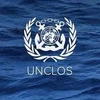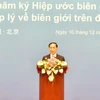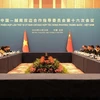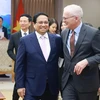The sixth international workshop on the East Sea opened in the central coastal city of Da Nang on November 17, with the participation of more than 200 Vietnamese and international academics and representatives of the diplomatic corps in Vietnam.
Entitled “East Sea: Cooperation for security and development in the region”, the two-day event will discuss factors that impact on the East Sea issue, international law and cooperation, measures to build trust at sea and preventive diplomacy.
Addressing the opening ceremony, President of the Diplomacy Academy of Vietnam, Ambassador Dang Dinh Quy, said the East Sea issue developed more complicatedly in 2014 than in previous decades.
“The more complicated the situation, the more attention the international community pays to it,” he stated, adding that an amazingly large number of academic papers, pieces of journalism and politicians’ speeches had been dedicated to this issue, as well as peace and security in the region.
The settlement of disputes by peaceful means on the basis of international law, especially the 1982 United Nations Convention on the Law of the Sea (UNCLOS) and the Declaration on the Conduct of Parties in the East Sea (DOC), and the prevention of actions that complicate the situation have become a requirement of the international community for all parties involved, he added.
State leaders have to carefully consider the interest of their nations before deciding to undertake actions regarding the East Sea in order to establish effective mechanisms to control disputes and conflicts at sea, he said.
Chairman of the Da Nang municipal People’s Committee Van Huu Chien said as one of the localities bordering the East Sea, any development at sea directly affected the city’s security, economic development and social stability.
“More than ever, the current East Sea situation is posing an urgent demand for a long-term solution to disputes in the region,” he said, affirming that the issue could only be solved based on full consciousness and profound understanding of arising challenges and opportunities, as well as the concerted efforts of all the parties involved when facing these challenges and opportunities.
Myint Thu, Deputy Director of the ASEAN Affairs Department under the Foreign Ministry of Myanmar, said the East Sea issue remained a high priority for the bloc.
ASEAN leaders adopted a number of declarations emphasising the importance of peace, stability and maritime security in the region, and abiding by the DOC and the Six-Point Principles on the East Sea.
He reiterated the ASEAN Foreign Ministers’ requirement that parties involved must not use or threaten to use force to handle disputes and accelerate the negotiations on a Code of Conduct in the East Sea (COC).
The Joint Statement of the recently-ended 25th ASEAN Summit reaffirms the bloc’s aspiration and agrees to speed up measures in order to better control the situation in the East Sea, he added.
Da Nang city’s leader Van Huu Chien also proposed experts discuss boosting maritime economic cooperation, maintaining the investment climate, increasing economic, trade and tourism ties, and ensuring the safety of fishermen.
He also suggested seeking the role and contributions of littoral localities of countries concerned in safeguarding peace and accelerating cooperation in the East Sea.-VNA
Entitled “East Sea: Cooperation for security and development in the region”, the two-day event will discuss factors that impact on the East Sea issue, international law and cooperation, measures to build trust at sea and preventive diplomacy.
Addressing the opening ceremony, President of the Diplomacy Academy of Vietnam, Ambassador Dang Dinh Quy, said the East Sea issue developed more complicatedly in 2014 than in previous decades.
“The more complicated the situation, the more attention the international community pays to it,” he stated, adding that an amazingly large number of academic papers, pieces of journalism and politicians’ speeches had been dedicated to this issue, as well as peace and security in the region.
The settlement of disputes by peaceful means on the basis of international law, especially the 1982 United Nations Convention on the Law of the Sea (UNCLOS) and the Declaration on the Conduct of Parties in the East Sea (DOC), and the prevention of actions that complicate the situation have become a requirement of the international community for all parties involved, he added.
State leaders have to carefully consider the interest of their nations before deciding to undertake actions regarding the East Sea in order to establish effective mechanisms to control disputes and conflicts at sea, he said.
Chairman of the Da Nang municipal People’s Committee Van Huu Chien said as one of the localities bordering the East Sea, any development at sea directly affected the city’s security, economic development and social stability.
“More than ever, the current East Sea situation is posing an urgent demand for a long-term solution to disputes in the region,” he said, affirming that the issue could only be solved based on full consciousness and profound understanding of arising challenges and opportunities, as well as the concerted efforts of all the parties involved when facing these challenges and opportunities.
Myint Thu, Deputy Director of the ASEAN Affairs Department under the Foreign Ministry of Myanmar, said the East Sea issue remained a high priority for the bloc.
ASEAN leaders adopted a number of declarations emphasising the importance of peace, stability and maritime security in the region, and abiding by the DOC and the Six-Point Principles on the East Sea.
He reiterated the ASEAN Foreign Ministers’ requirement that parties involved must not use or threaten to use force to handle disputes and accelerate the negotiations on a Code of Conduct in the East Sea (COC).
The Joint Statement of the recently-ended 25th ASEAN Summit reaffirms the bloc’s aspiration and agrees to speed up measures in order to better control the situation in the East Sea, he added.
Da Nang city’s leader Van Huu Chien also proposed experts discuss boosting maritime economic cooperation, maintaining the investment climate, increasing economic, trade and tourism ties, and ensuring the safety of fishermen.
He also suggested seeking the role and contributions of littoral localities of countries concerned in safeguarding peace and accelerating cooperation in the East Sea.-VNA



















